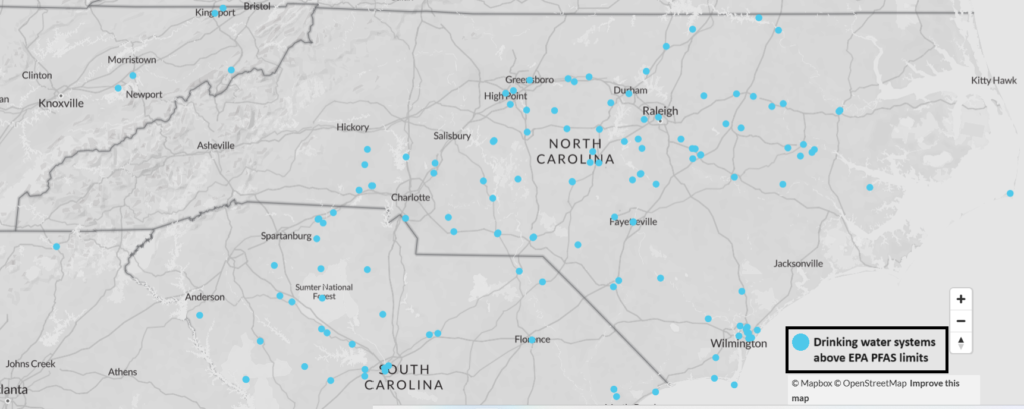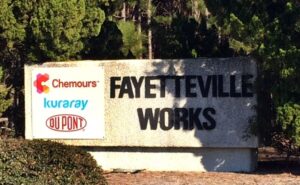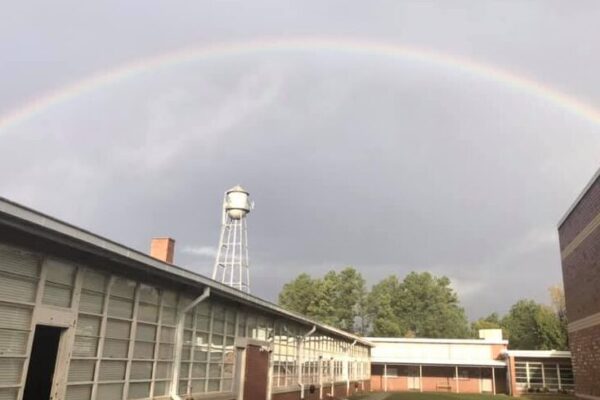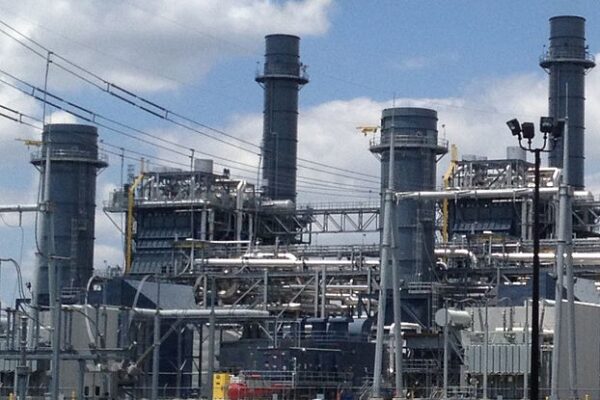Guest article by: Madeline Jones, author of “All About Water” Blog, student at Southlake Christian Academy
Is there a local environmental issue you care about? Consider writing about it for CWFNC’s newsletter & blog!
99% of the US population that has been tested has per- and polyfluoroalkyl substances, or PFAS, in their blood. These compounds inspired the coining of the term ‘Forever Chemicals’ as they are extremely slow to break down in the environment and thus accumulate in water bodies’ sediment, soil and all organisms’ tissues . High bodily concentrations of these chemicals can result in complications in human neurological, reproductive, cardiovascular, and immune systems.
Furthermore, certain PFAS have been labeled as carcinogens. These chemicals enter the body by ingesting food, water, or air contaminated by PFAS. Although certain PFAS have been around since the late 1930s, their innumerable problems have only been widely noticed by the public of North Carolina since the 2010s. Clean Water for North Carolina, however, has been researching PFAS and advocating against their use from as early as 2003.

Map from Environmental Working Group on drinking water systems that tested above EPA’s new limits.
In 2002, DuPont, a chemical manufacturing company, began producing a PFAS called C8, a nonstick and stain-resistant chemical commonly used in kitchenware and carpets. Unbeknownst to most of the public, this dangerous chemical was being released from the factory, where it contaminated the surrounding water and air.
By 2003, Clean Water for North Carolina began advocating for the end of production for C8 after meeting with a researcher for the US Steelworkers union. This union expressed concerns for the DuPont workers and the environment after receiving data of high concentrations of C8 in the DuPont factory workers’ blood. Based on these concerns, Clean Water for North Carolina started discussing the issue with a regulator in the Hazardous Waste Section of the NC Environment and Natural Resources agency. These discussions combined with sampling around DuPont led to the discovery of significant levels of C8 in the groundwater surrounding the DuPont plant and downstream in the Cape Fear River.
The issue proved even more serious after further discussion with the local folks downwind from the plant, who were aware of C8 in their ponds, groundwater, and wells. By late 2003, Clean Water for North Carolina had started frequently meeting with farmers and other individuals concerned about their health and livestock, experiencing strange respiratory issues, rashes and tumors. Even as the evident problems of C8 increased, the chemical continued to be produced and evaded regulation by government agencies. Although Clean Water for NC continued to educate and advocate for the regulation of C8, most of the public in North Carolina was oblivious to the chemicals that had already contaminated their drinking water and were in many of their household products.
Clean Water for NC’s Response
To address this growing crisis at the source, members from Clean Water for North Carolina and individuals downriver from the DuPont factory traveled to a shareholder meeting of the DuPont corporation to testify about their concerns and experiences about the spread of C8. By their third year of meetings, this group convinced thirty percent of the shareholders to stop the production of C8 altogether. This was an extremely significant accomplishment, as the shareholders were making a substantial profit in the production of this chemical.
After repeated pressure from CWFNC and other advocates in the media and at shareholder meetings, calling for an end to PFAS production, DuPont entered into a stewardship agreement with the Environmental Protection Agency, resulting in them paying a large penalty and phasing out of C8 at Fayetteville Works.. This allowed DuPont to create new PFAS and chemicals to replace C8, which could avoid the regulations placed by the Environmental Protection Agency. As a result, DuPont began to develop chemicals that they stated were “safer” than C8, a claim that was not supported by any data and has proved to be false.
As DuPont began to receive criticism for its pro duction of PFAS, it created a spinoff company called Chemours in Fayetteville in 2015. Chemours began producingthe PFAS, Gen-X, which they claimed was a “safer alternative” compared to other PFAFS, although Gen-X causes the same health issues as C8. Additionally, this creation of Gen-X allowed the chemical to be unstudied and unregulated by the Environmental Protection Agency, as the stewardship agreement had only applied to the chemical C8. As Chemours produced stain-resistant and nonstick materials, Gen-X and many other related compounds were released into the environment, contaminating the air and nearby waterways, especially the Caper Fear River.
duction of PFAS, it created a spinoff company called Chemours in Fayetteville in 2015. Chemours began producingthe PFAS, Gen-X, which they claimed was a “safer alternative” compared to other PFAFS, although Gen-X causes the same health issues as C8. Additionally, this creation of Gen-X allowed the chemical to be unstudied and unregulated by the Environmental Protection Agency, as the stewardship agreement had only applied to the chemical C8. As Chemours produced stain-resistant and nonstick materials, Gen-X and many other related compounds were released into the environment, contaminating the air and nearby waterways, especially the Caper Fear River.
In 2017, the production of PFAS gained nationwide attention as high concentrations of Gen-X were found in the River and wells. This proved disastrous for many communities and counties along the river, as the Cape Fear River is their main drinking water source. A study conducted in Wilmington and Brunswick counties found high concentrations of Gen-X in the Cape Fear River basin and the community’s drinking water including schools! This issue is exacerbated by the fact that only a specific and relatively expensive type of filter can remove PFAS from drinking water. This is extremely problematic, as there are limited studies on the long-term effects of PFAS, and many of the regulations for these chemicals are just beginning to be implemented by the Environmental Protection Agency. In fact, just last week, the Environmental Protection Agency created its first national drinking water regulation for only two PFAS compounds of thousands. Many of the issues caused by PFAS have been brought to the attention of the Environmental Protection Agency by organizations such as Clean Water for North Carolina advocating for the removal and regulation of PFAS.
Almost every person in the United States contains PFAS in their blood received from their drinking water and food packaging and other materials in their homes, schools, and communities. As one consumes these chemicals, they unknowingly subject themselves to toxins that have been known to cause a range of cardiovascular, neurological, and reproductive issues, and probably cancer. If left unchecked, these chemicals will continue to plague the environment for generations to come. Therefore, it is essential to advocate to government agencies for our rights to clean drinking water free from these ‘forever chemicals’ to end the spread of these carcinogens.
To join us in the fight, Clean Water of North Carolina is asking you to consider attending the administrative meetings conducted by the NC Dept of Environmental Quality to regulate PFAS in groundwater in North Carolina. The regulation of PFAS in groundwater is crucial, as over 50 percent of the United States population receives their drinking water from groundwater sources, which are easily contaminated by PFAS. This contamination can occur when rainwater infused with PFAS seeps into the soil and collects as groundwater beneath the surface, or if sludge or refuse containing PFAS release the compounds into the groundwater.
PFAS in Groundwater Hearings Dec. 2 & 3- Join us!
By showing up and testifying about your story or experience with the issue of PFAS, you can help support the case against them. Moreover, you can express your support for the federal and North Carolina limits for PFAS. Clean Water for NC points out it is also important to note the significance of taking a stronger stance on the eradication of the production of PFAS, as this is the only way to stop their spread!
The administrative hearings on Groundwater Standards for 3 PFAS compounds will be as follows:
Wilmington: December 2, 2024, at 6 pm in Wilmington at U-170, Union Station Building, Cape Fear Community College
Raleigh: December 3, 2024, at 6 pm in Raleigh at Ground Foor Hearing Room, Archdale Building, 512 N. Salisbury Street.
You can also comment by email. Visit CWFNC.org/pfas for more information and talking points.
THANKS FOR SPEAKING UP FOR OUR WATERS AND HEALTH!
Works Cited
chemsec. “99 per cent of Humans have PFAS Chemicals in their Blood.” chemsec, https://chemsec.org/wrappedinchemicals/facts/pfas-fact-1/. Accessed 20 November 2024.
Mcninch, Alasdair. “Taking on the ‘Forever Chemical’ Threat in North Carolina School Water Supplies.” Facing South, March 15 2023, https://www.facingsouth.org/2023/03/taking-forever-chemical-threat-north-carolina-school-water-supplies. Accessed 20 November 2024.



